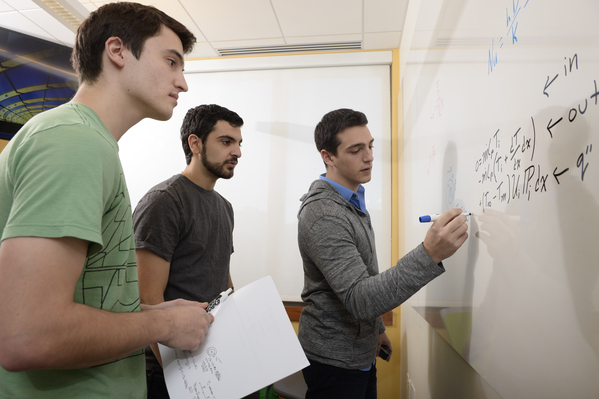Northeastern launches master of science in innovation

Northeastern University has launched a one-year, part-time graduate program aimed at teaching working professionals how to infuse innovation into the DNA of their organizations.
The master of science in innovation is designed specifically for working professionals who want to become innovation leaders. Offered through the D’Amore-McKim School of Business beginning this fall, the program will give students the chance to learn the fundamentals of innovation in business, expand their skill set, work on experiential innovation projects, and position themselves for corporate advancement.
“In a globally competitive economic environment, the only source of sustained competitive advantage has to come through innovation,” said Hugh Courtney, dean of the D’Amore-McKim School of Business. “This isn’t about being creative, but how you generate ideas and build an organization to really drive innovation into the market.”
The Boston Globe featured the program in an article Friday morning.
Northeastern is a global leader in innovation and entrepreneurship, with a particular focus on solving global challenges in health, security, and sustainability.
The program’s inaugural class will comprise about 30 students, each of whom will have a corporate sponsor. During the yearlong program, the student will work on an innovative project that the sponsor’s company will adopt.
The program’s project-based curriculum ensures that graduate students will be able to take advantage of Northeastern’s experiential learning model, which is anchored in co-op.
“The co-op model is fantastic,” said Marc Meyer, co-director of Northeastern’s Center for Entrepreneurship Education. “It has been around for a long time, but only now many more people are seeing its value. And now with this new master’s program and what we are doing across graduate programs in the business school, we’re finding out what co-op means for traditional graduate education.”
The program comprises two phases. In the first phase, students will focus on identifying an opportunity for innovation within a company based on customer or user-based needs. The second phase will center on how students can bring that innovation to fruition.
To reach their goals, students will work on projects, analyze case studies, and take in lectures from leaders in the business community. In addition to their course work, students will have access to other campus resources, including Snell Library’s 3-D printing studio, a design studio, and possibly IDEA, Northeastern’s student-run venture accelerator.
“In traditional graduate classes you come up with a plan,” said program director Tucker Marion, the Sam and Nancy Altschuler Faculty Fellow, Bornstein Endowed Faculty Fellow, and professor of technological entrepreneurship at Northeastern. “We’re focusing on the second step—implementation.”
One of the program’s goals, he said, is “seeing what we can do to move that plan forward from within the company. These projects will be a real benefit to the students and add value to the companies.”
The program will begin with a three-day intensive residency at Northeastern’s campus in Ashland, Mass., where students will work on team building. Classes will then be held every other Saturday.
The convenient schedule, Meyer said, will allow Northeastern to attract prospective students from outside the Greater Boston area and tap into their business communities.
The all-day Saturday classes will also foster strong working relationships between the students and faculty—a common design principle in these kinds of programs. “The logic is that very experienced working professionals learn so much by going through a program together,” Courtney said.
The program is seeking students from a variety of professional backgrounds who have been working in the same industry for several years and want to re-invent their company’s culture of innovation.
“We want students who will come to this program with a purpose,” Meyer said.





